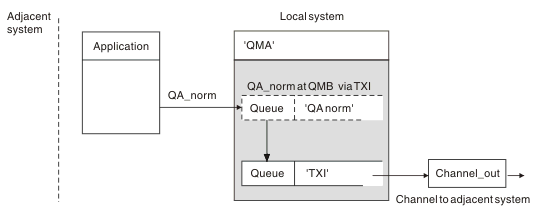Choosing the transmission queue
Figure 1. The remote queue definition allows a different transmission queue to be used
In a distributed-queuing environment, when we need to change a message flow from one channel to another, use the same system configuration as shown in Figure 1. Figure 1 shows how you use the remote queue definition to send messages over a different transmission queue, and therefore over a different channel, to the same adjacent queue manager.
For the configuration shown in Figure 1 provide:
- The remote queue object ‘QA_norm’ to choose:
- Queue ‘QA_norm’ at the remote queue manager
- Transmission queue ‘TX1’
- Queue manager ‘QMB_priority’
- The transmission queue ‘TX1’. Specify this in the definition of the channel to the adjacent system
Messages are placed on transmission queue ‘TX1’ with a transmission header containing ‘QA_norm at QMB_priority’, and are sent over the channel to the adjacent system.
The channel_back has been left out of this illustration because it would need a queue manager alias; this is discussed in the following example.
In a clustering environment, you do not need to define a transmission queue or a remote queue definition. For more information about this, see the WebSphere MQ Queue Manager Clusters book.
Parent topic:
WebSphere MQ distributed-messaging techniques
ic10830_
Home
